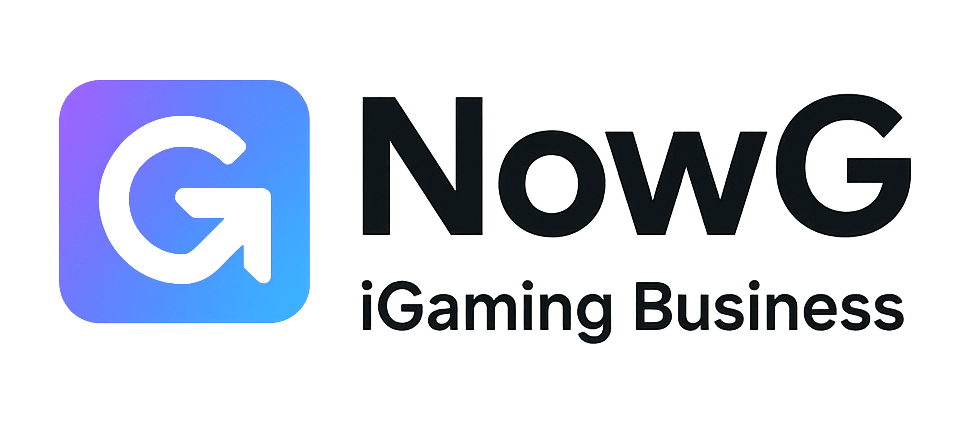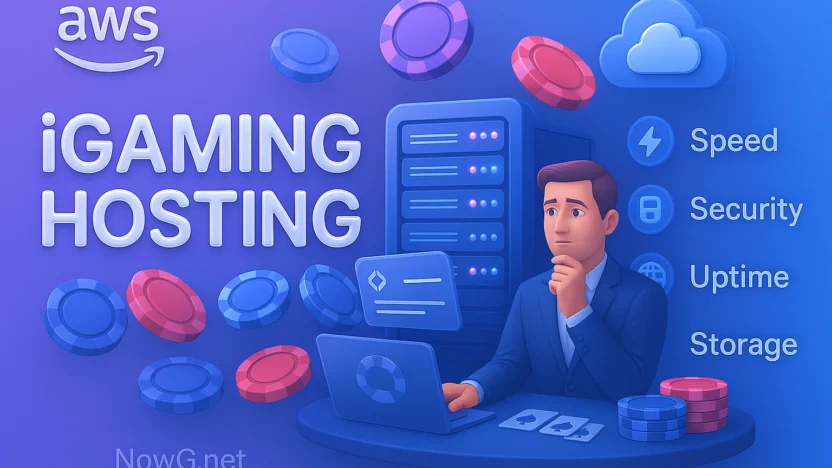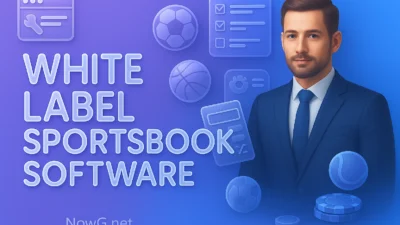Last Updated on November 19, 2025 by Caesar Fikson
Let’s get straight to the uncomfortable truth: you can’t treat iGaming like a regular SaaS blog or a lifestyle store running on a $10 VPS. Regulated gambling stacks carry a different operational burden—data residency requirements, in-state deployment mandates, cage access for regulators, immutable log retention, real-time risk controls, KYC/AML integrations, and DDoS adversaries who don’t take weekends off. If your platform’s uptime and compliance posture wobble, your license, your handle, and your hard-won SEO traffic wobble with it.
At NOWG, I usually frame hosting as part of your risk stack—right alongside licensing, payments, and RG tooling. Pick the wrong foundation and you’ll fix it later at 10x the cost, under pressure, with regulators watching. Pick the right partner and your tech team gets to focus on product velocity—markets, features, promos—while the heavy lift (compliance infra, resilience, low-latency delivery) runs quietly in the background.
Below, I’ll walk through the “why specialized hosting” case, then benchmark ten credible iGaming hosting providers with global coverage. Each name links to its homepage so you can jump straight to pricing, footprints, and service catalogs. After that, a practical comparison table and a brutally honest look at advantages vs. drawbacks so you aren’t surprised in procurement.
Why you shouldn’t host iGaming on “regular” infrastructure
Regulatory residency & in-state deployment. Many jurisdictions require that your production systems (or specific data classes) sit in the jurisdiction. In the U.S., several states require in-state hosting for sports betting/iGaming workloads—down to specific racks and approved facilities. First-time founders often underestimate how much regulator sign-off hinges on where, exactly, the servers live and who can physically access them. (A few states even stipulate secured “cages” and auditable access logs.)
Certification & audit trails. It’s not enough to say your provider has ISO 27001 or PCI DSS. Your implementation must support regulator audit, including immutable log pipelines, disaster-recovery runbooks, role-based access controls, and evidence your production controls match your policies. When you’re asked to produce six months of security logs for a dispute or an incident review, your host and SIEM pipeline have to deliver—fast.
Latency and gameplay experience. Slots, RNG table games, live dealer streams, risk engines, and bet settlement all amplify latency. Put a live-dealer hub 150 ms away from a key customer market and your drop-off rate will tell you about it. The right host gives you presence where the players are and where the regulator says you have to be.
DDoS and fraud pressure. iGaming is a magnet for volumetric DDoS, application-layer floods, and hostile botting. Generic “best effort” protection isn’t good enough. You want layered mitigation (L3/L4/L7), global scrubbing capacity, and tight integration with your WAF, rate limiting, and anti-automation stack.
Disaster recovery & business continuity. Many regulators expect documented RTO/RPO targets, secondary sites in the same jurisdiction (or a permitted fallback), and regular DR tests. Your host should make that provable, not painful.
If those needs sound familiar, you’re shopping in the right aisle. Here are ten providers worth a serious look.
The Top 10 iGaming hosting providers (global view)
1) Continent 8 Technologies
If you’ve been anywhere near regulated sports betting and online casino, you’ve heard this name. Continent 8 sits inside key regulated markets with regulatory-ready colocation and managed services—especially across U.S. states where “in-state” really means in-state. Their U.S. pages explicitly cover compliant deployment options for New Jersey and Pennsylvania, and they publish guidance for new markets like Brazil, which signals real depth in regulatory engagement.
Strengths: First-to-market playbook in new jurisdictions, regulator relationships, dual-site patterns for data-residency and DR, layered cybersecurity tied to gaming needs.
Trade-offs: Premium pricing versus commodity hosts; lead times for highly specific cage builds can be longer (because, compliance).
2) Internet Vikings
A specialist in licensed, in-state hosting for U.S. sports betting/iGaming, with bare-metal offerings aligned to state-level rules. Their material is plain about “fully in-state hosting solutions” meeting U.S. regulations—useful when your legal team is mapping multi-state rollouts with different residency obligations.
Strengths: Tailored hardware, in-state footprints, SEO-friendly auxiliary services (useful for affiliates and media arms), and teams that understand state-by-state onboarding.
Trade-offs: Smaller global footprint than hyperscalers; price points reflect compliance overhead.
3) Servers.com
This provider runs dedicated server fleets with iGaming-oriented guidance—think private racks in jurisdictions where regulators insist on physical segregation. Their compliance content hits the right notes: private rack requirements, data segregation, and predictable performance for risk engines.
Strengths: Bare-metal performance, straightforward procurement, and experience bridging MGA and other EU regimes.
Trade-offs: You’ll layer third-party CDN/WAF/DDoS or bring your own; not as many “one-bill” security extras as a specialized managed service.
4) Gcore
Best known for global DDoS mitigation and CDN, Gcore also offers hosting with integrated, high-capacity DDoS protection (200+ Tbps filtering capacity claimed). For iGaming platforms facing frequent hostility, the ability to keep TCP/UDP and application layers clean is tangible ROI.
Strengths: Massive network-level protection, global edge, sensible latency for APAC/EU plays.
Trade-offs: You’ll still solve for residency and regulator access; think of Gcore as a strong security/edge layer that you pair with compliant colocation where needed.
5) OVHcloud (Game & Anti-DDoS ranges)
OVHcloud’s Game servers include specialized, always-on DDoS protection tuned for gaming protocols, with unmetered bandwidth in many regions and compelling price-performance. Although OVHcloud is not specifically a gaming regulator specialist, it can contribute to a hybrid model that includes compliant colocation when necessary, along with OVHcloud edge services for content, lobbies, or community services.
Strengths: Cost-effective performance, dedicated “Game” mitigation, broad global presence.
Trade-offs: Residency and regulator access aren’t baked in; your legal/compliance counsel must validate use per market.
6) Switch
A Nevada data-center heavyweight that’s been formally registered as a hosting center for online gaming by the Nevada Gaming Commission—useful lineage if you’re building Nevada-tied workloads or want facilities that speak regulator.
Strengths: Deep Las Vegas footprint, regulatory familiarity, serious power/connectivity.
Trade-offs: You’ll integrate security/CDN layers and manage multi-state or multi-country needs across other providers.
7) AWS (Gaming & Regulated Workloads)
AWS isn’t a “gaming regulator host,” but it does publish patterns for regulated gaming workloads—covering data residency with Local Zones/Outposts and practical guardrails. Plenty of iGaming stacks run pieces on AWS (marketing, BI, CDPs, KYC flows) while production bet settlement stays in a regulator-approved cage.
Strengths: Global scale, mature security services, analytics and ML breadth, hybrid options for residency.
Trade-offs: You are responsible for compliance—proofs, controls, and audits—so plan for architecture reviews and documentation sprints.
8) BMIT Technologies (Malta)
A Malta mainstay with multi-site data centers, ISO 27001/PCI-DSS, and long-standing ties to MGA-licensed operators. If Malta is your B2C base or DR site, BMIT’s colocation and managed options map well to the island’s regulator expectations.
Strengths: Local expertise for MGA licensees, multi-site, managed services.
Trade-offs: Primarily Malta-centric; you’ll pair with other regions for LATAM/US/APAC growth.
9) Melita Business (Malta)
Another strong Malta option with Tier III-spec facilities, dedicated servers, and colocation; they explicitly market iGaming-compliant hosting for MGA licensees across two DCs. For new EU entries or replication, it’s a pragmatic choice.
Strengths: MGA-oriented offers, network resilience, 24/7 managed options.
Trade-offs: Regional scope; pair with CDN/edge and other jurisdictions as you scale.
10) NetShop ISP
A boutique provider with data centers in Malta, Cyprus, the UK, Singapore, Netherlands and more, marketing ISO 27001/PCI-DSS facilities and iGaming experience. For affiliates, white labels, or newer brands, the combination of VPS/bare-metal/colo plus hands-on support is attractive.
Strengths: Flexible footprints in iGaming-friendly hubs, cost-effective ramps, responsive to smaller teams.
Trade-offs: You’ll orchestrate global DR and compliance proofs; not as turnkey as the biggest specialists.
Quick comparison table (what each does best)
| Provider | Best for | Regulated market posture | Security/Edge posture | Watch-outs |
|---|---|---|---|---|
| Continent 8 | U.S./EU regulated production, rapid market entries | In-state U.S., regulator-aligned deployments | Managed cybersecurity, multi-site DR | Premium pricing; lead times for bespoke cages |
| Internet Vikings | U.S. in-state bare metal for sportsbooks/casinos | Tailored to state rules | Solid infra; you’ll add CDN/WAF as needed | Smaller global spread than hyperscalers |
| Servers.com | Dedicated iGaming hardware with private rack options | EU focus; helpful MGA guidance | BYO security stack or mix-and-match | You design the compliance overlay |
| Gcore | DDoS-heavy threat models; global edge | Residency must be designed on top | 200+ Tbps filtering; L3–L7 mitigation | Pair with compliant colo for regulated states |
| OVHcloud (Game) | Price-performance for game-style workloads | Not regulator-specific | Always-on Anti-DDoS + Game mitigation | Compliance proofs are your job |
| Switch | Nevada locus; U.S. west hosting | Registered hosting center for online gaming | Enterprise-grade DC ecosystems | Add multi-region partners yourself |
| AWS | Hybrid regulated architectures; analytics/ML | Residency via Local Zones/Outposts | Rich security services, logging, IAM | Shared responsibility; audit discipline required |
| BMIT (Malta) | MGA licensees; EU DR | Strong Malta presence | ISO/PCI; managed ops | Malta-centric—augment for other regions |
| Melita (Malta) | MGA-compliant hosting & colocation | Two DCs; iGaming offers | Tier III-spec, SLA-driven ops | Regional scope; integrate global edge/CDN |
| NetShop ISP | Cost-savvy multi-hub footprints | Malta/Cyprus/UK/SG/NL | ISO/PCI DCs; flexible builds | Verify specific regulator acceptance per market |
How to choose (and not regret it in six months)
Start with your license map. Plot where you’re licensed today and where you’ll file next. If the plan says New Jersey, Pennsylvania, Michigan, and Brazil within 12 months, prioritize partners already present in those states and actively tracking Brazil’s technical norms. Continent 8 publicly publishes U.S. state pages and has commentary on Brazil’s Ordinance 722; Internet Vikings is explicit about in-state U.S. hosting; Malta players like BMIT and Melita align naturally with MGA workloads.
Decide what lives where. Many successful operators run a hybrid: regulated production (bet settlement, player wallets, KYC events) in compliant racks, and supporting services (content/CDN, marketing sites, analytics pipelines) in clouds like AWS or cost-efficient bare-metal ranges (OVHcloud Game). Document this split up front so audits don’t derail you.
Model latency like it’s revenue (because it is). Put your live dealer stream and RNG close to players. Use providers with footprints in your biggest traffic corridors and a DDoS network that scrubs locally to reduce jitter (Gcore, OVHcloud’s Game mitigation, etc.).
Insist on evidence, not promises. During vendor selection, ask for: recent regulator acceptance letters for specific states; DR test reports; SOC 2/ISO 27001 certificates; proof of log immutability; and a named TAM who understands iGaming—not just “gaming” in the esports sense.
Plan the exit as you enter. Contracts should include data portability, migration support, and predictable timelines for decommissioning hardware in regulated cages. If a vendor change is a two-quarter ordeal, price that risk now.
Advantages and disadvantages of specialized iGaming hosts
Advantages
- Compliance acceleration. Providers with regulator-recognized facilities shorten the road to go-live. In U.S. states with in-state requirements, your deployment options narrow fast—working with in-market hosts reduces friction.
- Operational resilience. Dual-site builds in jurisdiction, documented DR, and round-the-clock ops with gaming-aware runbooks.
- Security that matches the threat. Always-on DDoS with high capacity, app-layer protections, and incident SLAs designed for betting peaks.
- Commercial clarity. Many iGaming-savvy hosts know how to structure SLAs around game days and promotion spikes—less hand-holding, fewer surprises.
Disadvantages
- Higher cost than commodity hosts. You’re paying for location, certification, and people who can answer regulator questions credibly.
- Footprint fragmentation. No single provider covers every jurisdiction with equal depth; you’ll often run a multi-provider strategy.
- Vendor lead times. Caged racks, cross-connects, and regulator inspections don’t spin up like a generic cloud instance. Build timelines into your go-to-market.
Practical deployment patterns that work
- Regulated core + cloud edge. Put wallets, bet engines, and core game servers inside compliant racks (Continent 8, Internet Vikings, Switch in NV; BMIT/Melita for MGA). Offload marketing sites, static assets, and community features to AWS/OVHcloud, protected by a robust DDoS/CDN layer (Gcore or your preferred WAF/CDN).
- State-by-state micro-sites (U.S.). Each state gets its own in-state stack for production; shared services (risk models, CRM, data lake) run centrally with careful data routing and per-state stores to satisfy residency. Use Local Zones/Outposts or private racks depending on regulator comfort.
- EU hub with low-latency spokes. Anchor in Malta for MGA, then peer into DE/SE/ES edges via your DDoS/edge provider to cut latency for live-dealer and streaming.
RFP checklist (use this with your shortlist)
- Residency & regulatory fit for each target jurisdiction (letters of acceptance, prior audits, named references).
- Security posture (DDoS capacity, L7 rules, WAF integrations, SIEM feeds, incident SLAs).
- Network design (latency to key ISPs, peering, traffic engineering during events).
- DR/BCP (documented RTO/RPO, secondary sites, test cadence, last test report).
- Access control & logging (immutable logs, dual-control on break-glass, physical access journaling).
- Commercials (burst clauses for major tournaments, cross-connect pricing, exit terms).
- Support model (gaming-aware TAMs, 24/7 NOC, escalation paths).
Final word (and a nudge)
The gap between “it runs” and “it’s compliant, resilient, and fast under pressure” is exactly where specialized iGaming hosts earn their keep. Don’t buy on logo alone. Buy on proof: accepted by regulators where you operate, fast where your players click, and strong enough to shrug off the weekend DDoS you will attract.
If you want a no-nonsense way to sanity-check your shortlist and stress-test latency, promotions, and compliance dependencies, try NOWG’s free online tools for casinos. They’re built for exactly this kind of decision, and they’ll save you a few expensive missteps before procurement locks in.




